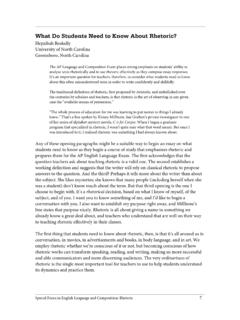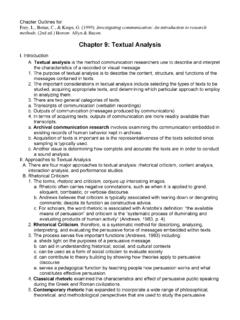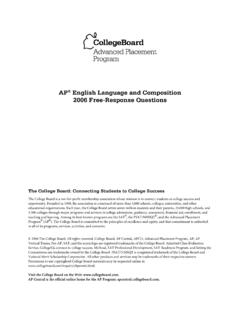Transcription of Genre-Based Approach: What and Ho w to Teach and to Learn ...
1 English Language Teaching; Vol. 9, No. 9; 2016 ISSN 1916-4742 E-ISSN 1916-4750 Published by Canadian Center of Science and Education 45 Genre-Based Approach: What and How to Teach and to Learn Writing I Wy. Dirgeyasa1 1 English and Literature Department, Faculty of Languages and Arts, Universitas Negeri Medan, Indonesia Correspondence: I Wy. Dirgeyasa, Senior Lecturer English and Literature Department, Faculty of Languages and Arts, Universitas Negeri Medan, Jl. Willem Iskandar Pasar V Kotak Pos No. 1589 Medan 20221, Indonesia. Tel: 62-816-3104-710. E-mail: Received: June 14, 2016 Accepted: July 16, 2016 Online Published: July 17, 2016 doi: URL: Abstract In Indonesian education context, recently the word genre seems to gain its most popular and hot issue to teaching and learning English, particularly writing skill.
2 However, many of them the students, teachers, or university students, or even lecturers in universities apparently are not good at understanding and are not truly well informed about the genre itself. It could be said that the word genre is still a kind of mystery to uncover. This paper is an attempt to present the nature of genre, genre writing, genre as a product of writing, and genre as an approach to teaching and learning writing. Keywords: genre writing, a product of writing, teaching and learning writing 1. The Nature of Genre Etymologically, the word genre is derived from the French language meaning form or type . Then, originally, the word genre which is also used in Biology science means genus referring to the classification of flora and fauna (Stokes, 2006; Himawan, 2007).
3 This means that the early concept of genre is to classify the species into a certain class due to its typical similar characteristics (Dirgeyasa, 2015). After that, the use of genre developed overtime, genre is applied in any various aspects of life such film, music, literature, etc. In music, for example, genre is used to refer any music categories such as pop, gospel classic, R n B, etc, whereas in movie, that there are also many types of genre like drama, western, science picture, and so forth. In literature it is often heard the words like novel, drama, poetry etc. In short, it can be simply said that genre means type or kind, or class of a particular thing or object. Then recently, genre is also used in linguistics study. In linguistic study, genre becomes a kind language object to study.
4 As a matter of fact, the study of genre in linguistics literacy is based on Systemic Functional Linguistic-SFL (Halliday, 1978; Swales, 1990; Hyland, 2003). Then, Christie dan Martin (2000) adds that linguistic functional becomes a basic and fundamental reference in the framework of the usage of the language in term of genre. So what is genre in term of the language and linguistics? Martin (1999) states that genre is communication activity having and orienting goal. Then, Swales (1990) simply defines genre is a communication event in which the members have a set of communication goal. By referring two statements above, it can be said that genre is a process of communication which has a certain goal (goal oriented) for its members in a certain event of communication due to certain social context.
5 Genre is a matter of communication event by social context. Consequently, the different social context then, tends to lead to different genre. In line with the concept of genre, then, Christie dan Martin (2000) adds states that genre is the particular usage of the language in a certain social circumstance such as interview genre, media genre, or advertisment genre, and so forth. In addition (Halliday and Hasan, 1989) as quoted by (Hyland, 2003) stated that: This theory addresses the relationship between language and its social functions and sets out to show language a system from which users make choices to express meaning. Halliday argues that the language users have to use and develop the specific ways of using language to accomplish goals, which means that texts are related to social context and the other texts.
6 Broadly, when a set of texts share the same purpose, they will often share the same structure, and thus, they belong to the same genre. English Language Teaching Vol. 9, No. 9; 2016 46 Referring to the previous statement, it can be simply defined that genre is a kind of text either oral or written in which there is relationship between language and its sosial function. Due to distinctive social functions, the usage of language tend to apply different genre depending on existing social function. Hereafter, genre is then defined the use of the language by means of typical and specific way in order to achieve specific goal. By this context, it seems that the most important thing to keep in mind is that a kind of text either oral or written which has the same goal and same lexico-grammatical features will be the same genre.
7 In addition, Swales (1990) further argues that: A class of communication events, the members of which share some ethnographical communication, but typically need further validation set of communicative purposes. The purposes are recognized by the expert members of the parent discourse community, and thereby constitute the rationale for the genre. This rationale shapes the schematic structure of the discourse and influences and constraints choice of the content and style. Communicative purpose is both a privileged criterion and one that operate to keep the scope of a genre as here conceived narrowly focused on comparable rhetorical action. In addition to purpose, exemplars of a genre exhibit various patterns of similarities in terms of structure, style, content and intended genre name inherited and produced by discourse communities and imported by others constitute valuable.
8 What Swales has stated is seemingly clear that genre has a number of characteristic and features such as a) genre has a particular communication event, b) genre has a specific goal (goal oriented), c) genre is different and various in accordance to its typical features, d) each genre has a matter of limitation and rules including content, physical form, and shape, and e) every genre belongs to a certain discourse community. In line with dicourse community, (Widdoson, 2007) adds that genre is shaped or existing due to the existing discourse community. It is a fact that different discourse community has different genre. Talking about discourse community and genre in connection to discourse community. Swales (1990) as cited by (Ohoiwutun, 1996) clarifies that characteristics of discourse community in terms of the usage of language in social context is a) a certain discourse community has certain communication goals approved, b) the discourse community communicate within its members, c) a certain discourse community use a certain pattern of communication for its members, d) the discourse community tends to have more than one types of genre to communicate , and e) the discourse community, at last gains a number specific register.
9 2. Genre Writing It seems that genre and genre approach in writing are relatively new in teaching and learning English. Genre in writing is a part of genre in language use. Thoreau (2006) simply states that genre in writing or genre writing is a kind or type of writing in which it has a typical style, particular target of readers, and a specific purpose. Referring to Thoreau s statement, it could be said that genre covers three main aspects namely writing style, readers, and goal (goal oriented). In line with style, Thoreau, then claims that writing style means how something is written; the words that are used and the way the information is organized. Then, Scott and Avery (2001) support Thoreau s idea by stating that style in writing is words or expressions used to write the writing and how language patterns are expressed.
10 Referring above statement, genre writing tries to see writing from different perspective. It is a different angle how writing is viewed and how it is written and how it is analyzed It is extremely different form conventional perspective about writing (Dirgeyasa, 2015). It can be simply concluded that genre writing is a new perspective to teaching writing due to different perspectives. It also important to note that one of the central insights of genre analysis is that writing is embedded in social situation , so that a piece of writing is meant to achieve a particular purpose which comes out of a particular situation . In terms of genre writing, Hyland (2003) as cited in (Dirgeyasa, 2015) proclaims that: Genre implies that students to write not just to write but to write something to achieve some purposes such as it is a way of getting something done, to get things done, to tell story, to request an overdraft, to describe a technical process, to report past event, and so on, we follow certain social convention for organizing messages because we want our readers to recognize our purpose.















